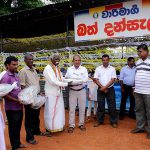The storyteller
How a teacher tells stories to overcome language and mentality barriers.
Munasinghe was a teenaged teacher from a village in Batticaloa District where hot winds blew near the Kokilai lagoon and gun-shots from the Mullaitivu jungles could be heard.
He had come teach in Thalkolamulla, a remote Sinhala village in that district, where a Sinhala school was surrounded by a Tamil community. The school had very few teachers and students.
Since he had been born in the East, Munasinghe did not know a word of Tamil. He also never felt the urge to learn it until he saw a village girl named Shakila and regretted not speaking her language.
One evening, while Munasinghe was returning to the teacher’s quarters after school, he encountered Shakila while she was walking along the foot-path with her puppy. He could not turn his eyes away from her face until the sight of her faded. She was so beautiful, he thought. And he continued looking at her, long after she had walked away.
One day, they made eye contact. She spoke through her eyes then lowered her gaze. Again, he regretted not being able to speak her language. ‘How lucky the puppy was to walk along with her’, he thought.
“Kuwa… surukka vaa” she told the puppy to come.
This young man cracked a joke and her reaction to it was a smile. One day he spoke to her but she did not respond. On another day, she got closer to him and inquired about something but he could not understand her.
After few encounters the puppy got familiar with him and the animal gradually learned Sinhala too. When he said “Kuwa, mehe varen” (Kuwa, come here) it went to him and ate what he gave the dog. Kuwa grew very fond of him. When someone went to the teachers’ quarters, the puppy barked and gave signals that a stranger was around the corner.
“Kuwa, you are very lucky,” he told the dog. “You know Tamil and now Sinhala as well. You show your love to your sister and also understand her love towards you. You also love me. I love you too. But we humans do not know how to tell our love!” He told the puppy stroking its head.
On a bright day in August, he was eagerly waiting for Shakila with a bunch of blueberries in his hand. “This is for you, do you like it…?” he asked when she approached near.
“Oh! Ithu naavalpalam” (Oh! these are blueberries); while receiving the bunch of fruits Shakila uttered a few words. This poor teacher could not understand anything she said but managed to write down the sentence as he heard it, on a leaf.
The following day, he took the leaf to school and showed it to a fellow teacher who understood Tamil. “It does not mean anything, maybe you did not write it properly,” was his colleague’s answer.
During the last phase of the war in 2008-2009 the young teacher got transferred to his home village. After the war ended he went to the Thalkolamulle Teachers’ quarters to obtain certain work documents.
When he returned to the village everything had changed completely. He saw rubble where the school had been. He was looking for known faces but there were none to see. He climbed up a mound, looking at the far field. He had only a glimpse of the dust cloud covering the sky. He suddenly felt that something was on his feet. It was Kuwa. He fondly took Kuwa in his arms and embraced it. “Do you still remember me, my darling?”
After a few minutes, Kuwa struggled to release himself from the man’s grasp hearing the voice “Kuwa, where are you, where have you gone…?” It was the voice of Shakila.
He turned to where the voice came. He was shocked to see a weak girl standing there. Her face was pale and her dress was shabby and her hair was disheveled. She looked like an old woman. She was waiting for Kuwa to join her.
Oh my god! It’s Shakila. He could not believe his eyes. He followed the girl and the dog to find out where they were going to… The path led to the refugee camp…
An autobiographical tale
The above excerpt is a true story from ten years ago, written as a short story by Sarath Munasinghe, Asst. Teacher of Rambewa Maha Vidyalaya.
Ranasingha was inspired to write this story after another incident he experienced twenty years ago – mistrust and suspicion led to misunderstanding, due to the lack of communication.
Munasinghe was a student at the Teachers Training College. From Anradhapura, he took the train to Polgahawela and got the night train to Badulla.
When the night train reached Badulla it was very early in the morning. He then had to wait on the bench in the railway station for four hours in the cold, to get the bus to the quarters. This was his routine.
One day, when reaching Bandarawela Munasinghe started a conversation with a fellow passenger.
“I am also going to Badulla,” the passenger told Munasinghe, “and I live close to the station; rather than wasting 4 hours in this chilling cold, you can stay with me and rest,” the stranger said.
Munasinghe agreed and both proceeded to the room which was on a hill. “I’m sorry, I did not catch your name,” Munasinghe asked.
“I am Puvanenthiran,” the stranger said.
Munasinghe was surprised when he heard the name and worried, with the situation in the country, if he would have trouble with the police for staying with a Tamil person? Who is this person? Could he be a robber? Why is he voluntarily helping? These were the types of questions that ran in the back of Munasinghe’s mind.
Munasinghe was scared of every move Puvanenthran made. He also thought of running away.
There were two simple beds in the room. First, Puvanenthran arranged a bed for the visitor and told him to lie down and rest.
Munasinghe was tired but he could sleep with the thoughts running through his mind. The fear of Puvanenthran was burning inside of him.
Puvanenthran came and covered him fully with a thick blanket. But still Munasinghe lay awake.
Puvanenthran thought the visitor could not sleep because of the mosquitoes and went near him and swatted them away.
The next morning they both had tea and started walking towards the bus stop. Puvanenthran carried Munasinghe’s travel bag until he boarded the bus and he bade farewell once Munasinghe was comfortably seated.
Munasinghe was still suspicious. Immediately after Puvanenthran left, Munasinghe checked his cash and belongings in the bag. Everything was intact.
“Why did I behave like that with a person who took much trouble to take care of me? I could not express a word of thanks to him either.” Munsinghe felt ashamed.
From that day onwards Munasinghe began writing short stories and also made short films on this subject of prejudice. His short story “Kuwa” won first prize in the North Central Province Arts and Cultural Event.
Although Munasinghe is a teacher, his lessons about reconciliation come through short-stories and short-films.
“There is no problem in our country as being Tamil or Sinhala. The only barrier is the language,” Munsighe said. “If they can understand each other’s language the problem can be easily solved through dialogue. Today, there is no medium to tell about the feelings of each other. This is what I mean by a language barrier. We’re trapped there. Is it not the context of Kuwas’s story…?”











